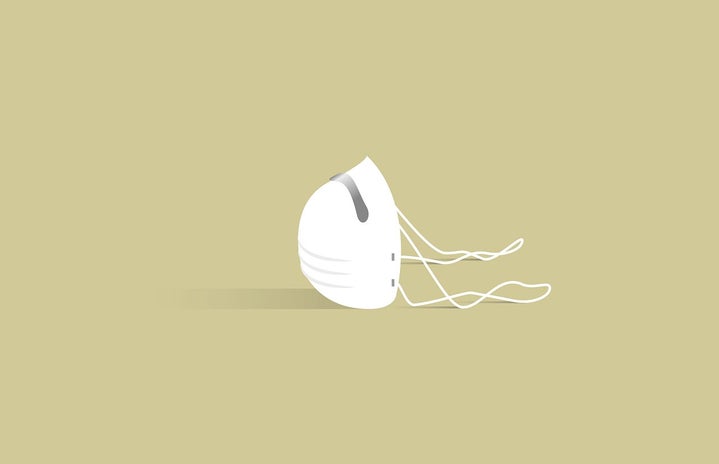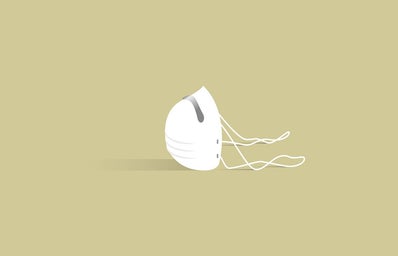As the coronavirus epidemic continues to grow, the only thing standing between us and the movie “Contagion” are the medical professionals and staff of our hospitals. They are the ones handling the virus and treating the infected, the ones who are trying to find cures and the ones creating rapid tests to determine who is a carrier. They are heroes and deserve to be praised for their dedication. What we aren’t doing is remembering that they are human – they have lives, families they are unable to see and the stresses of keeping a whole society from collapsing. The nurses are on the front lines; they make direct contact with the virus daily, oftentimes with inadequate supplies, long hours and not enough staff. There are pictures circulating of nurses with bruises on their faces due to the use of these masks. It’s getting worse, because people choose to stay out and not follow CDC guidelines. One of these brave nurses has agreed to do this interview. Due to the social media restrictions placed on the staff, I have excluded her name and the name of her hospital. I can reveal, however, that she works at a hospital handling a bulk of the COVID-19 cases in South Florida.
Her Campus: So, what inspired you to choose nursing as a career path?
Nurse: I always thought of nursing as an unsolved puzzle. Like every puzzle, no person is alike. The people you see in hospitals all have problems that need to be fixed. I enjoyed the thought of not having a routine job. I liked the idea of always needing to use my brain and act like a detective to help my team solve a problem.
HC: What was your major? Where did you go to school?
N: In school, I went to a community college to complete my prerequisites and then transferred to a private institution to complete my bachelor’s in nursing.
HC: When did you graduate?
N: I graduated in December 2019.
HC: When did COVID-19 start to really affect your hospital?
N: The first week I started. My orientation was completely changed. Like all across America, policies are changing hourly on how to provide better and safer care to our patients and keep ourselves safe.
HC: How has been the transition from school to going to work in a global pandemic?
N: It has been crazy. A lot of the orientation stuff that I would normally receive has been modified. The normal bridge of transitioning from student nurse to a licensed nurse is a hard transition to make and throw in a global pandemic and everything seems all out of whack. The normal structure of week one orientation gets thrown out the window and you are expected to play catch up quickly and safely.
HC: Tell me about what you are experiencing at work right now. What are you seeing, feeling, hearing, etc.?
N: Right now, my orientation has been modified. Training classes have been switched from in person to online to keep education moving forward and to maintain social distancing. I feel an abundance of all emotions. There is so much that is unknown and being discovered daily, so things change quickly, and you have to be on top of all of the changes and new information.
HC: How has COVID-19 affected your day to day work? Your hospital, its patients, your program and its staff?
N: COVID-19 has affected the new grad onboarding program across countless hospitals. Some hospitals have paused the process and others have modified their programs to bring in new grad nurses. Hospitals all across America are instilling policies daily to help provide quality and safe care for the patients and to protect staff.
HC: Does it look like the situation is getting better or worse?
N: I can’t really say. Only time will tell. All we can do is pray for the curve to flatten, patients to get better and a treatment to be found.
HC: Do you have any advice or tips for being healthy during this time?
N: Wash your hands, be mindful of personal space and others personal space. Keep your hands to yourself when out in public and keep going out to a bare minimum to keep exposure to the minimum. It is tough but it must be done.
HC: Is there any way the general public can help medical professionals?
N: Support, donating medical supplies, staying at home to prevent the spread. Things like that really make the difference.
HC: Any last thoughts you want to leave with readers?
N: If everyone can do their part, we can help flatten the curve. The stay at home is not a punishment, but a way to help get us better. Do it for your parents, your siblings, your grandparents, the old couple down the street, your teachers and local businesses. Everyone can find a reason to stay home. We all need to stay home and do our part to get back to normal.
I couldn’t have put it better than the way she said it. Stay home, wash your hands. Flatten the curve. These are unprecedented times – we should act like it. Not just for us, but for everyone who is on the front lines, working to keep all of us safe.
Want to see more HCFSU? Be sure to like us on Facebook and follow us on Instagram, Twitter and Pinterest!



